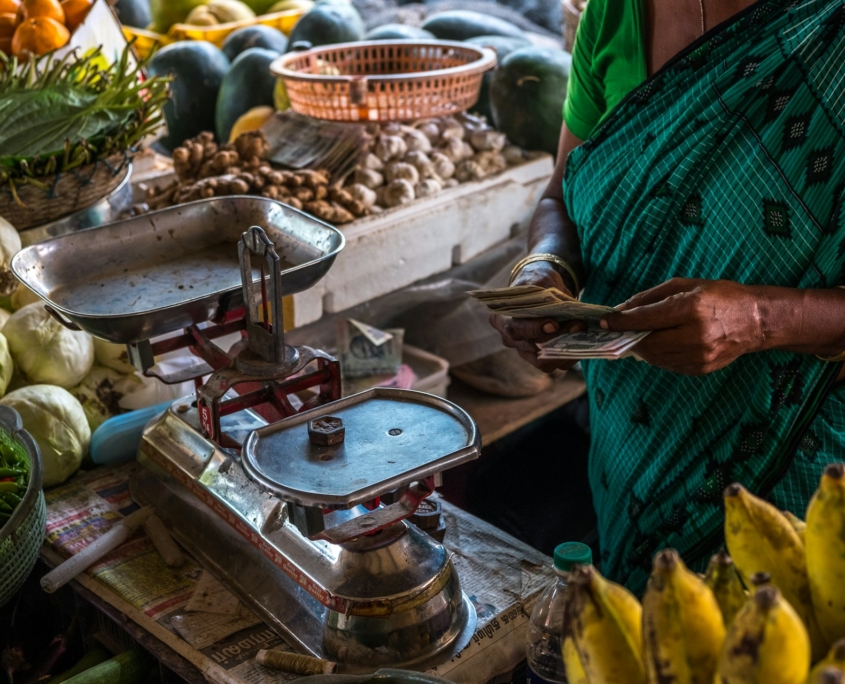Solidarity Economy an Effective Remedy for Poverty
 In efforts to fight poverty, local organizations are turning to a solidarity economy, which at its core, prioritizes social gain over profit. These organizations integrate concepts of human development, equal participation and sustainability. In some cases, such as with the Deccan Development Society in India, solidarity economic models have addressed structural deficiencies and inequalities by focusing on individual well-being and sustainable production. Fundamentally, a solidarity or social economy aims to balance social and economic goals and address poverty. Organizations within this model emphasize the social impact of their output instead of profit maximization.
In efforts to fight poverty, local organizations are turning to a solidarity economy, which at its core, prioritizes social gain over profit. These organizations integrate concepts of human development, equal participation and sustainability. In some cases, such as with the Deccan Development Society in India, solidarity economic models have addressed structural deficiencies and inequalities by focusing on individual well-being and sustainable production. Fundamentally, a solidarity or social economy aims to balance social and economic goals and address poverty. Organizations within this model emphasize the social impact of their output instead of profit maximization.
Solidarity economies feature cooperative governance, democratic decision-making in economics, sustainable production methods and a commitment to human rights protection. Although solidarity economy primarily refers to a network of local cooperatives and fair trade companies operating under a strict ethical code, it also encompasses a broader economic model. Some organizations and governments have highlighted its potential for policy implementation. It is viewed as a response to 21st-century challenges and a means to achieve the Sustainable Development Goals (SDGs).
A Response to Globalization and Inequality
Solidarity economic organizations emerged as a counterpoint to the shortcomings of globalization. They challenge its status as the sole path to development. These grassroots organizations, mainly in developing countries, have criticized the exploitation of natural resources for profit and the structural flaws that push people into low-skill, low-wage jobs. In addition, they lament the loss of cultural identity and knowledge due to the homogenization of society. The solidarity economy aims to address poverty and the inequalities driving it, such as regional disparities and social exclusion, by offering an alternative model that seeks to restore balance.
The Impact of COVID-19
Solidarity economies gained prominence after the COVID-19 pandemic. With businesses closing, billions were left without income, dependent on state initiatives or their savings. Solidarity economic organizations worldwide stepped up, showcasing the impact of a model centered on social needs. As the immediate effects of the pandemic receded, the long-term impact on global poverty emerged clearly. The pandemic also exacerbated inequalities; between 2019 and 2021, the income of the wealthiest quintile dropped by 0.9%, while that of the poorest quintile fell by 3%.
A Focus on India
India’s rapidly expanding economy contributed to a decrease in multidimensional poverty from 29% to 11% over nine years. While this appears as a significant achievement on paper, contrasting views question the authenticity of this impressive trajectory as the statistics suggest. Critics specifically target the methodology for calculating multidimensional poverty. They argue that the categories constituting the multidimensional aspect and the revenue baselines might have political motivations.
In India, high levels of inequality persist across the population. The wealthiest 10% control 80% of the country’s wealth. Structural inequalities continue, with rural areas nearly twice as likely to experience poverty as urban areas. Despite the official illegality of discrimination based on the caste system, it remains a significant factor in income distribution, along with the tribal system. The Dalit caste and Adivasis tribe, historically regarded as untouchables, live in marginalized rural communities and often hold low-paying jobs. Currently, members of lower castes and tribes represent five out of six people living in multidimensional poverty in India.
The Deccan Development Society
The Deccan Development Society was founded more than two decades ago, working in about 75 villages of Tanangala province, it aimed to unite 5,000 women from the Dalit caste living in extreme poverty to improve their living conditions. At the heart of their efforts lie solidarity economy principles and poverty alleviation through the communities’ self-reliant operations. These communities prioritize democratic processes, focusing on food and resource sustainability. They empower women from lower castes to engage in economic decision-making, incorporating permaculture, sustainable agriculture and education as key strategies for food security. The society’s autonomous yet collaborative approach to managing agricultural resources has enabled the production of an additional 1,000 meals per family annually.
The Deccan Development Society’s notable success has shown that solidarity economies are effective in mitigating poverty resulting from entrenched systems of inequality. Moreover, by focusing on sustainable and self-sufficient production that aims at well-being, society has reclaimed community agency against the backdrop of caste disparities. In 2019, the society received the United Nations (U.N.) Equator Award, is a distinguished recognition for organizations that combat poverty by sustainably utilizing biodiversity. While much of India faced production challenges during the COVID-19 pandemic, the Deccan Development Society managed to donate 10 kilograms of grains to the region’s relief efforts.
The Future of Solidarity Economy
Organizations advocating for the solidarity economy model, aim to address critical 21st-century challenges in the developing world, such as inequality, poverty and the scarcity of natural resources. The U.N. has established a task force under the Social and Solidarity Economy (SSE) umbrella to promote and study SSE’s role in achieving the 17 SDGs. Furthermore, the U.N. views SSE as a transformative force with the potential to redefine the implementation of the SDGs, emphasizing self-determination and an economy based on social needs. SSE is considered capable of influencing policy at the national level. Looking ahead, the impact of solidarity economies on poverty reduction could evolve into a global network, amplifying their progressive agenda for broader visibility and support.
– Felix Stephens
Felix is based in London, UK and focuses on Business and New Markets and Politics for The Borgen Project.
Photo: Unsplash
